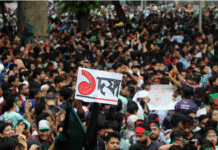
Banglad-eshis relish drama and nothing is more drama-filled than election time. The atmosphere will be one of excitement and uncertainty this year. 2018 will be noted for political dramas and policy dilemmas, resulting in economic doldrums.
There will be no big pro-market changes in economic policy lest this affects the vote bank—although the government may feel tempted to bring some policy changes. Massive dilemmas may overwhelm the government in regards to policies related to fix interest rates on national savings, fuel price adjustment, pension funds, new laws to downsize bad loans, and new rules to streamline the construction and transport sectors. Eventually, no remarkable changes will be seen.
2018 will be a bonanza year for businessmen-turned-politicians who will suddenly be “caring and kind” to the public and unusually dutiful to the tax office. The 700 major political players vying for 300 parliamentary seats will keep the entire country on its feet with campaigns and cash donations never seen before. But broad macro variables such as sector-wise production and growth will perhaps suffer from a lack of improvement. For example, the bond market in developed countries usually experience doldrums in the summer.
More money will be pumped into circulation, triggering the possibility of inflation although a big chunk of it will embolden the black economy. The latter though is temporary. And more temporary will be the promises made by the candidates—stimulation in consumption will perhaps not be accompanied by a corresponding increase in investment.
We are facing a different kind of year—slightly wired and unpredictable—not only due to the election but also the growing epidemic of defaulting loans. The economy is sitting on a volcano when it comes to the banking sector. The ethical void, which Professor Rehman Sobhan mentioned at the BEA biannual conference, will remain despite some sporadic crackdowns on defaulters. The capital market will hopefully keep on regaining its health which was badly affected during 2010-2011.
Bangladesh Bank will continue to crack down on defaulters in 2018—a good move that will build confidence among the stakeholders. The government’s efforts to rescue and revitalise the “bad apples” will nonetheless augment moral hazards, which are already on the rise due to indulging politically empowered defaulters. The Anti-Corruption Commission will continue hunting down financial criminals all throughout 2018, but very few will be punished. Financial discipline will still remain a far cry because litigations will follow the same pace, delaying justice.
The government will be cautious to maintain the numbers on GDP growth and per capita income—two of the most attractive selling points before the election. The growth trend is likely to slow down if investment tensions prevail. Sanchayapatra with its absurd nonmarket rates will induce people to park their surplus money, which will sit idle, rather than take up risky ventures in 2018. Since the government will not be able to implement VAT before the election, Sanchayapatra will be the instrument used to milk extra cash to support the budget for FY2019, which may ambitiously target 7.5 percent growth. But that figure will be hard to achieve since private investors will remain slightly nervous.
The employment scenario will not improve although a huge number of young people will find temporary jobs amidst the election campaign and a sudden rush of development work. The trade and retail sectors are expected to remain vibrant.
Some developments will of course give us something to be hopeful about—particularly in the areas of technology and communication. The service sector will perform better with almost seven percent growth, mainly because of increased focus of the government in this sector.
If monsoon season does not bring along destruction with it, agriculture will harvest more than three percent growth. The manufacturing sector will get a boost due to increased demand from the US and Europe. The industry is likely to see around 10 percent growth. Overall, GDP growth will stay above seven percent. Revenue earnings will get a boost by the government, partly to justify the postponement of the VAT law and partly to implement the ADP that is much-needed before the election. Constant improvement in infrastructure will encourage small and medium enterprises to grow.
Remittances are likely to exit the negative zone and do much better than the negative growth of 15 percent the previous year. A rise in remittances will mainly depend on the gradual decline in the exchange rate. But the government may not be too pleased to see the taka’s decline in value. Even if the central bank ignores (I doubt it) the government’s preference of preserving the taka’s value, the correction would be inadequate to boost exports remarkably. Import growth is likely to be double the export growth, justifying the constant hemorrhage of funds through illicit channels.
Although some banks will be in dire need for capital, overall market liquidity will be manageable and no sudden rise in the call money rate is expected. Bangladesh Bank’s steps to reduce policy rates (repo now at around seven and reverse repo at five percent) are unlikely because of the fear of a spending spree by the candidates—extra money that fuels inflation.
There will be no correction in income inequality because any step that displeases the tycoons will be consciously avoided. Exploitation in the garments sector (low wages and inhumane working hours) will continue without any constructive dialogue taking place because the government will not want to irk exporters in the face of a dwindling current account balance which has already plunged into an alarming deficit of USD 3 billion.
International reserves are likely to remain above USD 30 billion—enough to pay at least six months’ import bills. Private credit growth may rise, partly because of demands for machinery and equipment, partly for the growing necessity of working capital, and partly to fuel the stock market.
The liveability of Dhaka and Chittagong will probably not improve in 2018 as the government will avoid solving any issue that may weaken its support base. The urban economy will be all tangled up but people will make it through with the hope that things will change after the election. 2018 will be a year of high hopes despite all the dramas, dilemmas and doldrums.
Biru Paksha Paul is associate professor of economics at SUNY Cortland.
Source: The Daily Star.









